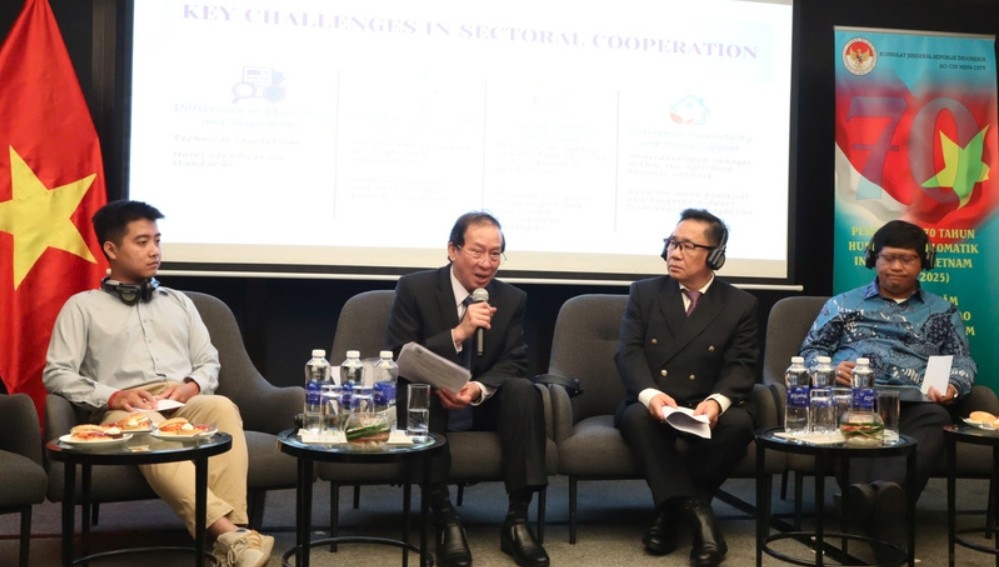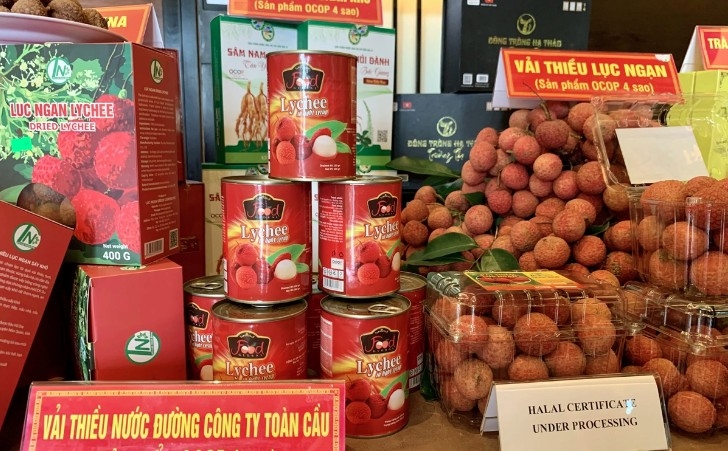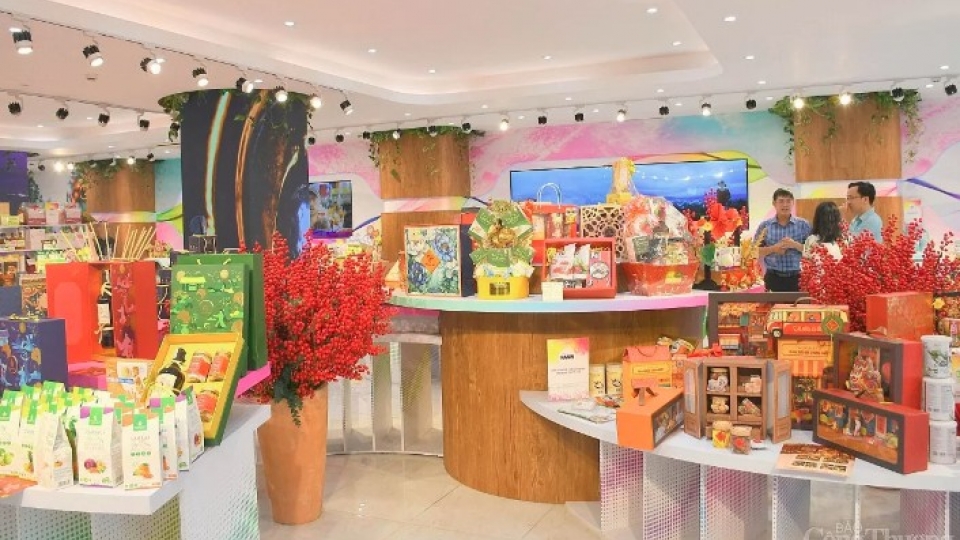Indonesia, Vietnam set ambitious target to boost food industry cooperation
VOV.VN - Vietnam and Indonesia target a bilateral trade turnover of US$20 billion by 2028, prioritizing cooperation in the food sector and food security.

The “Indonesia–Vietnam Food Security Cooperation Forum” officially took place in Ho Chi Minh City on August 11. The event was jointly organized by the Consulate General of Indonesia, the Vietnam Chamber of Commerce and Industry (VCCI), and partners. This is an important step to promote cooperation in food production and supply towards sustainable development and stable food security for both countries and the region.
Both nations are two large, dynamic ASEAN economies with many cultural, geographical similarities and development potentials. The strategic partnership between the two countries has been continuously strengthened and expanded, especially in agriculture, trade, and food security, which remain key sectors amid global uncertainties.
Since establishing diplomatic relations in 1955, bilateral cooperation has steadily developed. The two countries are working to upgrade to a Comprehensive Strategic Partnership by 2025, with the goal of raising bilateral trade turnover to US$18–20 billion by 2028. This reflects strong political trust and high expectations for cooperation. Both nations are active members of multiple free trade agreements such as ASEAN Free Trade Area (AFTA), Regional Comprehensive Economic Partnership (RCEP), ASEAN-China Free Trade Area (ACFTA),ASEAN-Japan Comprehensive Economic Partnership (AJCEP), ASEAN-Korea Free Trade Area (AKFTA).
Sharing at the event, Nguyen Truong Thi, Deputy Director of Ho Chi Minh City’s Department of Industry and Trade, said bilateral trade between Vietnam and Indonesia in 2024 reached US$16.7 billion, up 21.2% year-on-year. Vietnam’s exports to Indonesia were US$6.2 billion, while imports from Indonesia reached US$10.5 billion. Ho Chi Minh City recorded over US$1.6 billion in bilateral trade, increasing 23%, including US$638 million in exports and over US$960 million in imports. Key products include rice, textiles and garments, steel, coal, vegetable oils, and completely built-up cars.
As Vietnam’s largest economic and trade hub, Ho Chi Minh City plays a pivotal role in the national and regional food supply chain. Positioned as a gateway connecting the Mekong Delta, Vietnam’s rice bowl, to international markets, the city hosts many major food, seafood, and processed food businesses. Among these, Indonesian companies are important trade partners, especially in food and Halal products
However, Vietnamese enterprises still face difficulties exporting Halal goods to Indonesia due to different standards, complicated certification procedures, high costs, and long processing times. Therefore, representatives from Ho Chi Minh City’s Department of Industry and Trade proposed Indonesia organize more specialized workshops to share information and support businesses from both countries in understanding Halal standards and procedures to facilitate trade.
Additionally, the two sides were encouraged to enhance cooperation in logistics and infrastructure, especially connecting the Cai Mep - Thi Vai port cluster with major Indonesian ports to optimize bilateral food supply chains. Establishing effective coordination mechanisms between management agencies and business communities will provide a foundation to promptly resolve difficulties and create a transparent and stable business environment.
“Ho Chi Minh City’s Department of Industry and Trade pledges to continue acting as an active bridge between businesses of both countries to support effective and sustainable cooperation in food security,” Nguyen Truong Thi affirmed.
Challenges and solutions for food industry cooperation
At the forum, experts and officials discussed key solutions to promote bilateral trade cooperation, particularly in food and food security, aiming to reach US$18–20 billion in trade turnover before 2028.
Pham Thiet Hoa, Vice Chairman of the Ho Chi Minh City Food and Foodstuff Association (FFA), shared insights on opportunities and challenges in the food industry cooperation between the two countries. He underscored the sector’s vital role in ensuring food security while enhancing competitiveness and value addition to the economy.

According to Hoa, cooperation in food plays a key role in the bilateral trade development strategy. Vietnam currently exports many key product groups to Indonesia such as steel, machinery and equipment, textiles, footwear, and electronics. In the food sector, rice leads with exports worth US$746 million (up 16.5%), followed by coffee at US$212 million (up 60.4%), fruit and vegetables at US$10.9 million (up 26.7%), tea at US$10.8 million (up 47.9%), and seafood at US$17.2 million.
Conversely, Vietnam imports from Indonesia many items including coal (US$2.49 billion), steel (US$1.26 billion), completely built-up cars (US$1.03 billion), seafood (US$334 million, up 61.4%), along with base metals, vegetable oils, and machinery. This complementary trade structure forms a diverse foundation to expand cooperation, especially in the food industry.
However, Hoa pointed out major challenges faced by businesses on both sides. The first is the difference in standards and regulations, particularly Halal certification, a major barrier in exporting food products to Indonesia. Mutual recognition of Halal standards has not yet been fully synchronized, causing time and cost difficulties for enterprises.
The second challenge is technological limitations. Many small and medium enterprises (SMEs) in Vietnam lack resources to apply advanced technologies in food processing and preservation. In a market demanding high quality and safety standards, this is a weakness that requires improvement through training and technology transfer.
Climate change also poses a major direct impact on agricultural supply, calling for sustainable farming and the application of green technologies in production and supply chains.
Furthermore, Hoa said connectivity between Vietnamese and Indonesian businesses, especially SMEs, remains limited. The lack of networking and specific supportive policies hampers market expansion and the full exploitation of cooperation potential.
To overcome these, the FFA Vice Chairman proposed key solutions: promoting mutual recognition of Halal and food safety standards; simplifying administrative procedures; increasing training and technology transfer for SMEs; developing sustainable supply chains applying digital technologies such as IoT and Blockchain for transparency and traceability.
He also suggested expanding connections through international food and beverage fairs like Vietfood & Beverage, where businesses from both sides can meet, explore, and deepen cooperation. He encouraged research and development of products suitable for the Halal market based on the strengths of raw materials and culinary cultures of both countries.
“The Ho Chi Minh City Food and Foodstuff Association is committed to accompanying businesses from both countries to beef up effective cooperation, develop a sustainable food industry, and ensure regional food security,” Hoa affirmed.



